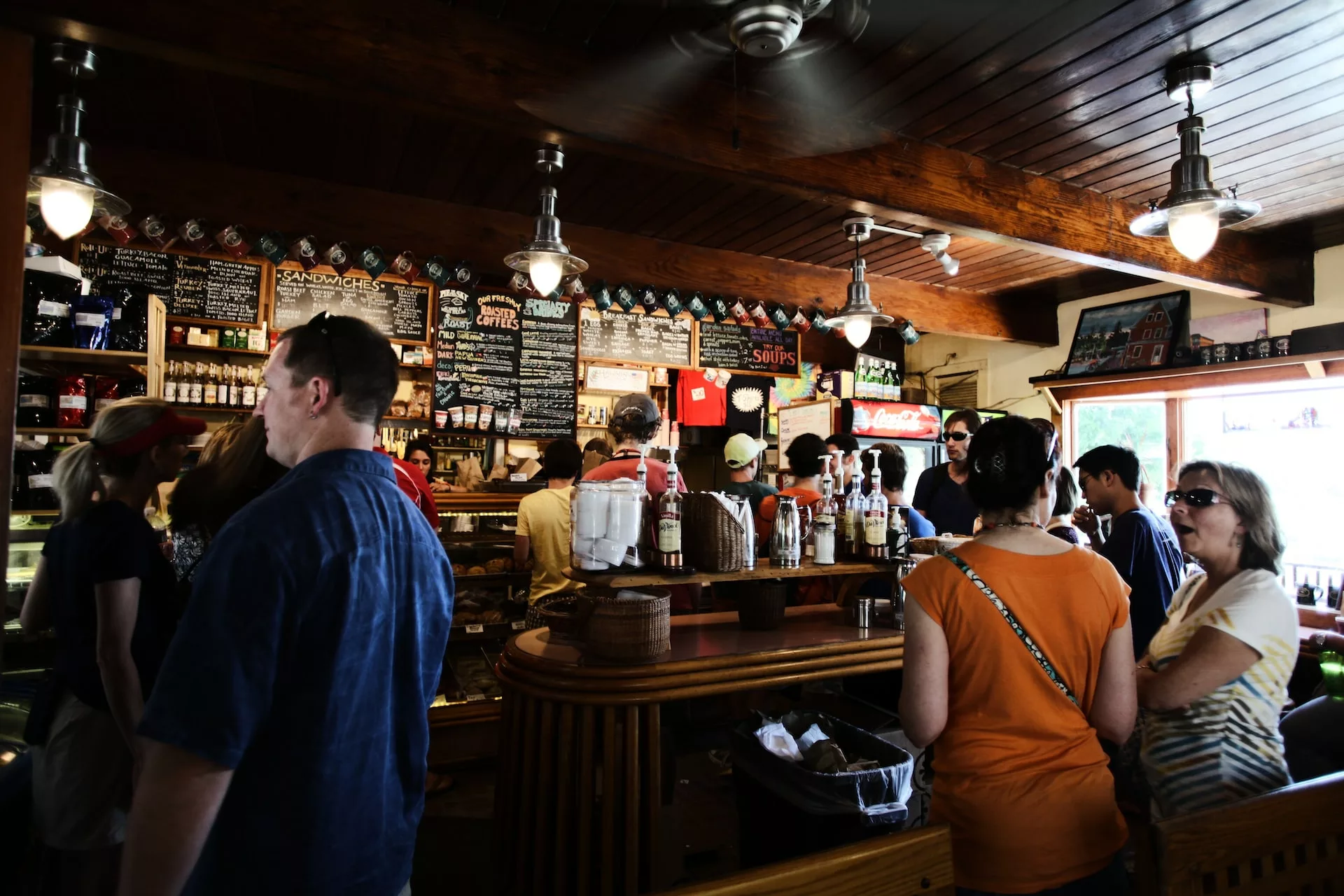Starting a coffee shop can be an exciting venture, but there’s no doubt it can also seem overwhelming. With the right preparation and planning, though, your dream of launching that perfect cup of java from your own small business can become a reality. Knowing how to write a business plan for your coffee shop is key to helping you figure out exactly what type of resources, equipment, staffing and marketing will be needed in order for you to achieve success. Read on for seven tips that will help get you started on writing the best coffee shop business plan possible!
Define your target audience
When planning a coffee shop business, it is essential to have a clear picture of who you are targeting as your ideal customer. Knowing your target audience will help you create more effective marketing materials, choose the right space and serve the types of beverages that will best appeal to them.
The first step in defining your target audience for a coffee shop is to consider the area or neighborhood where you plan on setting up shop. If the surrounding area is mostly residential, then chances are good that people living in those homes will be interested in patronizing the cafe conveniently located nearby. Think about what ages, backgrounds and lifestyles would likely be attracted to the shop’s offerings and how far they would be willing to travel if necessary.
Another important factor to consider is other existing businesses in the area and whether or not there’s already an oversaturated market for coffee shops. Knowing what type of customers already frequent these places can help you determine which potential customers could be targeted instead in order to get new business. Additionally, looking at statistics such as income level and education levels within an area might offer insight into what type of coffee shop appeals most to locals.
Once these preliminary steps have been taken, it’s then time to really narrow down the details of who exactly should be targeted with specific messages suited just for them. Some questions that may need answering include: Do they prefer certain types of drinks? Do they enjoy spending time talking with friends or family over their favorite beverage? What kind of atmosphere do they prefer when going out for coffee? Is price an important factor when deciding which cafe to go to?
By understanding all this information about potential customers before getting started with opening a cafe, you can begin formulating a successful business plan from day one that speaks directly towards catering towards people’s interests and needs—and therefore better position your business for success!
Research the coffee shop industry
As a business owner interested in opening a coffee shop, researching the industry is essential for developing an effective business plan. Knowing the current trends, competitors and customer preferences is key for determining the viability of your proposal. To start researching, consider several different sources of information such as industry publications and reports, surveys of potential customers, existing coffee shop owners and even direct observation of established businesses.

Industry publications provide insights into current trends and developments within the coffee shop landscape. Look for reports from organizations like The National Coffee Association or SCA which regularly publish surveys and data on topics like customer tastes, current spending habits and market projections. This type of material can provide a good overview of the industry’s position at any given point in time.
Surveying potential customers can also be very useful in gauging interest in your proposed shop. Creating a survey that asks questions about their caffeination habits, shopping preferences, food choices and beverage loyalty can help you identify unmet needs and create targeted offerings accordingly. Additionally, ask what they think would make your business stand out from similar shops in the area – this feedback can be invaluable when designing your marketing materials or setting pricing structures.
Reaching out to other business owners is another great way to learn more about running a successful coffee shop- they may be able to offer insight into expenses associated with getting started, staffing requirements and ways to draw repeat customers. These conversations don’t have to feel like an interview; simply talking to other entrepreneurs may be enough to pick up ideas that could inspire you while formulating your own plans.
Finally, if it’s possible during pre-opening stages take advantage of opportunities to sit inside existing coffee shops (both competitors and non). By observing customer interactions with staff members or looking at menu/counter displays you can gain valuable insights into creating a user-friendly environment for shoppers.
Researching all aspects of the coffee industry will not only help you create a solid business plan but will ultimately benefit your future operations as well by giving you a better idea of what works well in that specific area- both from practicality standpoint as well as understanding regional flavor preferences from its population base. Once armed with this knowledge put pen to paper (or screen) & start crafting!
Create a business model and financial plan
Creating a business model and financial plan are both essential components of any coffee shop business plan. A well-thought-out company strategy, including considerations such as marketing, pricing and staff requirements, will be key to getting your venture off the ground. Additionally, realistically evaluating potential expenses and income streams is paramount for understanding what resources you’ll need and how much capital investment you should anticipate in order to reach profitability.
The first step in creating your business model is outlining the core services or offerings you’ll provide. This will largely depend on the type of coffee shop you’re looking to open; specialty drinks such as latte art or nitrogen-infused cold brews may require specialized equipment or additional training for employees while a small café will likely focus more on providing basic beverages like drip coffee & tea alongside simple snacks. Furthermore, consider options for increasing revenue opportunities such as selling gift cards or offering delivery services in partnership with third parties like UberEats. Once these components are well established, it’s time to create your financial plan.
In terms of creating an accurate financial prediction model start by gathering data from existing local coffee shops which offer similar services–this could include current prices per cup/pound of coffee beans and equipment costs associated with their set up (espresso machines etc.). Additionally take into account potential expenses related setup & operations such as rent, utilities, payroll and other miscellaneous items that might be necessary for running your shop. Finally determine total income projections based on predicted number of customers frequenting your establishment daily/weekly/monthly & average size orders placed by each patron.
Assuming realistic predictions have been made & all factors have been taken into consideration it can be somewhat challenging to forecast profits in the early stages but don’t forget to look beyond initial numbers! If planned correctly over time one should notice an increase in returns due to economies of scale(such as buying supplies in bulk). In some cases additional revenue streams like catering or corporate partnerships may also help defray expenses while helping establish steady growth momentum within the organization over time -allowing owners to eventually expand locations when practicality (and budget) allows!
Develop a marketing strategy
Creating a successful coffee shop requires more than just excellent offerings. To make your business stand out from the crowd and gain customers, it’s essential to have an effective marketing strategy in place. A well-crafted plan should include elements like advertising, customer incentives and promotions, as well as content for your website & social media platforms.
To start developing your marketing plan consider how your coffee shop can target local neighborhoods, corporate centers or university campuses in order to capitalize on preexisting customer bases. Start by exploring existing promotional channels –from simple print materials like flyers or pamphlets placed around town to digital services like Google Ads or Facebook Ads campaigns — and determine which will be most cost effective while still reaching the intended audience. Additionally look into creating partnerships with organizations associated with nearby locations; this could include working with student groups at universities & colleges in order to offer discounted drinks which could potentially bring in more people in terms of both regular customers & single time visitors (this tactic also works very well for seasonal promotion periods such as holidays).
Incentives are also great way to attract & retain customers -offering loyalty programs showing appreciation to returning patrons often leads them feeling valued which can then encourage them come back again soon after! Research any similar offerings already being practiced by competitors & incorporate those into your business model–when comparing pricing structure ensure that yours is competitive while still accounting for profit margins you need to cover overhead expenses associated with running shop efficiently. Additionally offering discounts across other businesses complementary to cafe (such as local music stores or bookstores) allows patrons feel they are getting something extra when they patronize your establishment making them more likely return whenever possible!
Finally don’t forget about branding! It is important for potential customers recognize you immediately whether it’s via website logo design or through visual merchandising inside store itself – create distinct identity that will stick around customer minds long after they leave table! Always remember who you are competing against so stay up date on current trends & adjust accordingly if necessary -any changes must still preserve core aspects of what makes brand unique over time though otherwise original value proposition may get lost amid sea others vying for same space. At end day having strong presence both online & offline will give edge needed keep running steadily success!
Set up your operations plan
Setting up a coffee shop operations plan is an essential part of the business plan for any new café. It helps guide day-to-day activity in the café and ensures that tasks are completed efficiently and effectively. When planning out your operations, there are several elements that need to be taken into consideration.
First, set out the core activities you want included in your café’s operation. This could range from servings drinks, to providing food, hosting events, or even offering online ordering systems for customers. Developing a detailed procedure list for each of these activities will help ensure that everyone is on the same page when it comes to executing operations on the floor.
Next, consider what type of staff do you need to keep things functioning smoothly? Depending on the size and scope of your coffee shop’s needs, you may require baristas with specific skills or different levels of training; this could include barista certification or perhaps higher management positions such as a head barista. Make sure to also account for other tasks such as cleaning and maintenance which can be handled by less experienced staff such as dishwashers or janitorial personnel.
Furthermore, address how your cafe will manage customer service within its operations plan. Professionalism is key – ensure that all staff members are trained in excellent customer service practice when interacting with customers either face-to-face or through digital platforms if applicable. Smart technology options such as automated order systems can also streamline customer experience while reducing wait times and improving overall engagement at the same time.
Finally, develop methods for inventory tracking and supply management – this goes beyond just coffee beans; make sure you have everything from creamer and milk substitutes to syrups and teas readily available without running out frequently. Technology can come in handy here too – modern cafes often have computerized inventory systems installed which makes keeping track of stock much easier than manual methods would allow!
Setting up an effective operations plan requires thoughtful planning and dedication to making sure it gets executed properly each day. It’s important to remain flexible when it comes to modifying procedures based on feedback from customers or changing market conditions so that your café can stay ahead of its competition! With a solid foundation in place for your coffee shop’s operations plan you’ll be well on your way towards successful business!
Establish your brand identity
Establishing a well-defined brand identity is essential for any successful coffee shop business plan. A strong brand will set you apart from the competition and help to create loyalty among your customers. Here’s what you need to consider when creating your cafe’s unique identity.
First and foremost, determine why customers should choose your café over other options in the market. Establishing your unique selling point or USP can be difficult but it’s important – without defining it clearly you may find yourself competing with other cafés on price only, say a cheaper cup of coffee, rather than offering something special that customers just can’t get anywhere else!
To bring this point to life, define a clear message and tone of voice to accompany your café’s visual branding. Think about how you want your customers to feel when they enter your cafe – should it be an escape from the hustle and bustle of city life or a place where they can socialize with friends? This message should extend through all marketing material including visuals such as logos or even statements made on social media accounts associated with the café.
You’ll also want to make sure that all branding elements are easily recognizable so customers can quickly identify them even without having visited before; think about things like distinctive fonts or color combinations specific to the café which can help create memorable visuals for potential customers. Furthermore, make sure that any external materials such as menus or uniforms reflect the same branding elements so there is no confusion about who owns each establishment.
Finally, consider how you would like your brand to evolve over time; what new services could be added or modified based on customer feedback? Make sure that all branding elements remain consistent when launching anything new so that loyal fans know exactly where they are going each time they come back! As long as you have all these points wrapped up in one memorable package then congratulations – you have created a solid foundation for establishing a winning brand identity for your coffee shop business plan!
Detail your team
Writing the team section for a coffee shop business plan is an essential step in bringing your vision to life. It helps you identify who will work on the business, what roles they will play, and how they will contribute to the success of your venture.
Before you start writing the team section of your business plan, it’s important to consider both the short-term and long-term needs of your coffee shop. A solid team should have permanent members with industry expertise and complementary skill sets. Depending on the size and scope of your coffee shop, you may need to hire additional staff on a contract basis or bring on board interns or volunteers.
When it comes to creating a great team for your coffee shop, look for people with relevant industry experience. If possible, choose employees who have worked in specifically coffee shops before. Of course, having general retail experience is valuable too — but if you’re looking for someone to manage coffee-related operations, then more specific skills are desired. Additionally, select individuals who share your passions and vision for the cafe — their enthusiasm can go a long way!
It’s also vital that each new team member understands what makes your cafe unique from competitors in town. Having an internally driven sense of this overall mission helps ensure that everyone is working toward a common goal. Cohesiveness between teammates is critical; hiring people with compatible personalities can help foster connection and collaboration while eliminating potential conflicts down the road.
You don’t necessarily need to make all these decisions right now — there’s always room for tweaking later on — but it’s still key to identify structural roles up front such as manager or barista positions. In any case, be sure that your team members’ job descriptions are clear so everyone knows exactly what their responsibilities entail! You’ll want each employee well versed in not only skills needed like brewing excellent cups of joe but also tasks such as customer service or taking orders via point-of-sale systems.
At this stage in the process it’s also essential that you establish practices such as compensation structure (salary/hourly wage) benefits (insurance coverage), and holiday scheduling (paid time off). These are all details that need sorting out before you add additional staff since discrepancies between employees can create serious disharmony within teams –– resulting in unproductivity, lost morale, and higher turnover rates down the line.
Assembling a great team behind your coffee shop business plan will require commitment from everyone involved –– from owners & partners down through hired personnel & volunteers alike –– but taking extra care upfront will pay off exponentially in creating cohesion towards meeting shared goals!
Writing a comprehensive business plan for your coffee shop is essential to achieving success. By following these 7 tips, you can create an effective plan that allows you to chart out your growth and maximize profits. Remember: the more detailed and sophisticated your plan is, the better equipped you’ll be to turn your dreams of opening a coffee shop into reality.
More Coffee Shop Articles
Should I find a partner for my new Coffee Shop?
Launching a coffee shop can be an overwhelming task, especially if you have limited resources. Finding the right partner can be an invaluable asset to your business and help you reach your goals faster. In this post, we’ll discuss when it’s a good idea to find a partner for your coffee shop business.
Hit the Ground Running: How to Accelerate Your Coffee Shop Startup
Starting a new business is an exciting but daunting undertaking. If you want your coffee shop to take off and reach its full potential, it’s important to hit the ground running. In this post, we’ll explore how to accelerate your coffee shop startup by addressing key areas like planning, marketing, and operations.
What Professional Services Do I Need to Start My Coffee Shop?
Starting a coffee shop is a big undertaking, and it’s important to make sure you have the right professional services in place. In this post, we’ll explore what services you need to help make your dream of owning a coffee shop a reality.
5 Secrets to Local Marketing for My Coffee Shop
Local marketing is the key to success for any small business – especially a coffee shop. In this post, we uncover five tips and tricks that can help drive more customers through your door and boost your revenue.
Reducing Risk: Insurance Options for My Coffee Shop
Choosing the right insurance coverage for your coffee shop is an important part of reducing risk and protecting your business. Taking time to review available options and weigh the costs against potential risks can help ensure that you have the best coverage possible.
How Do I Get a Business License for My Coffee Shop?
Are you planning to open your own coffee shop? Make sure you know how to get a business license first! This post will explain step-by-step how to get the right license for your bustling cafe.
How Do I Find the Right Location for My Coffee Shop?
Opening a coffee shop is a big decision, and it all starts with finding the perfect location. In this post, we’ll take a look at what goes into choosing the ideal spot for your coffee shop business.
5 Mistakes Coffee Shop Entrepreneurs Make
Starting a coffee shop can be a daunting but rewarding task. But without the proper preparation, entrepreneurs can easily make mistakes that could prevent them from achieving success. This post covers five common pitfalls coffee shop owners should look out for to ensure they do not fall victim to them.
How to Find Funding to Start a Coffee Shop
Are you ready to become your own coffee shop owner? There are many ways to finance a new business, and this post will discuss how to find funding for your coffee shop dreams.










